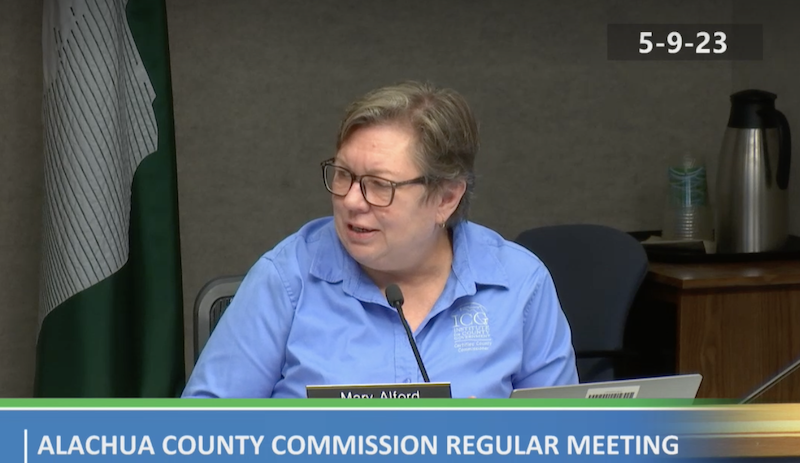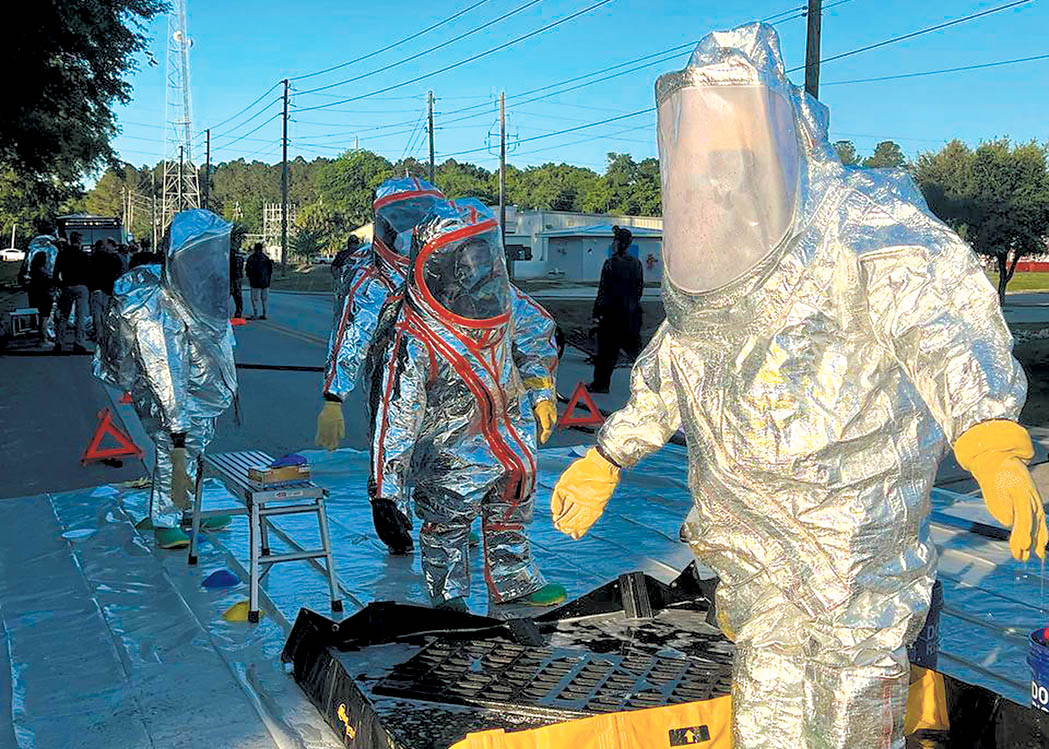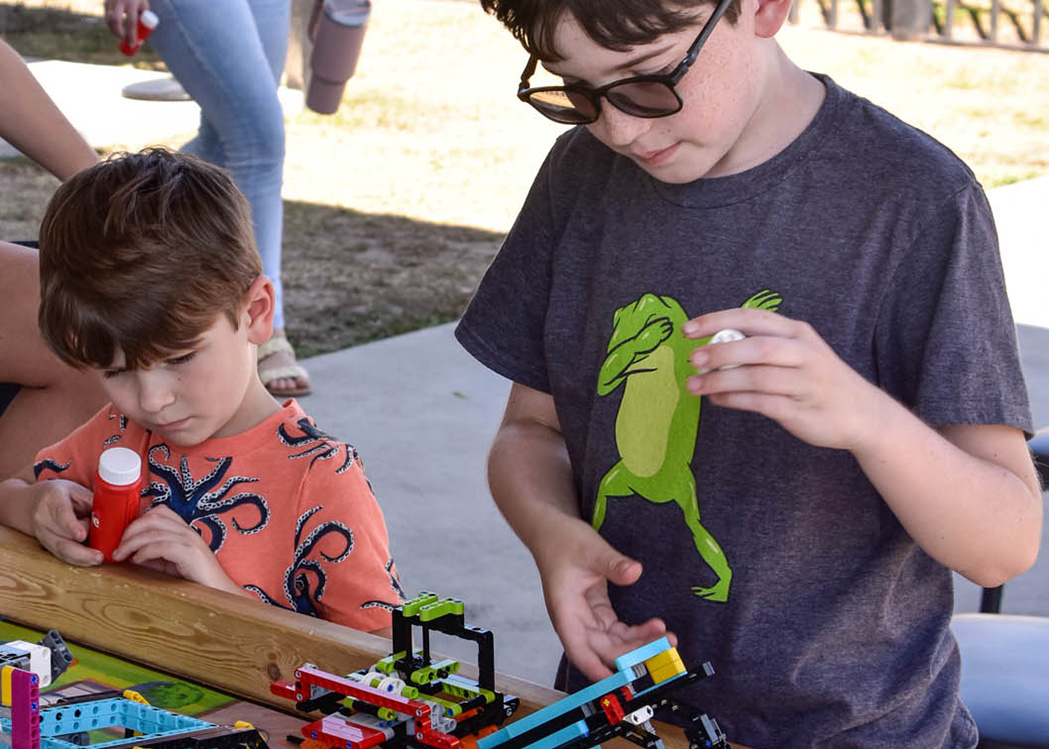
County Commissioner Mary Alford asks the board to begin discussing the four-laning of Archer Road going west
BY JENNIFER CABRERA/Alachua Chronicle
GAINESVILLE, Fla. – At the May 9 Alachua County Commission meeting, the board made some changes to their meeting rules, voted to ask the governor to veto an allocation for research into seasonal fertilizer restrictions, voted to send a Chair letter to the smaller municipalities asking for funding to develop a county-wide literacy plan, and voted to begin discussions that could lead to four-laning Archer Road going west in eight to ten years.
Thumb drives to be prohibited in County meetings
The changes to meeting rules were originally on the consent agenda, and during the adoption of the agenda, Commissioner Marihelen Wheeler said she’d had requests to pull the meeting rules from the consent agenda and put them on the regular agenda for discussion, but she thought it could be handled during “citizen comment.”
During public comment on the adoption of the agenda, Jo Beaty asked that the item be moved to a different meeting, providing more time for citizens to review the changes, which were discussed at a lightly-attended Special Meeting on May 2. Beaty particularly objected to a prohibition on bringing in thumb drives with material to be displayed during public comment.
Tamara Robbins said she believed that the prohibition on thumb drives arose because Commissioner Mary Alford didn’t want to see a video of a slaughterhouse. Robbins said she had asked County Communications Director Mark Sexton about the policy on bringing in videos that are loaded on portable devices, and she believed that request generated the rule change. Robbins said the County allows developers to bring in presentations on thumb drives and that she thought the rule discriminated against the public.
Commissioner Ken Cornell said he thought there should be a way to allow the public to bring in material on thumb drives, “the same way we do it for developers,” perhaps by isolating the presentation computer from the network.
Commissioner Mary Alford agreed that they should be able to come up with a way for members of the public to bring in material and that the reason she’d been concerned about the slaughterhouse video was a concern about “any video that might provide any sort of triggering type of presentation to anyone.” She said that might include “any type of violence or some aspect of racism or something that might be presented to the public at a meeting in a way that might not be appropriate.” She said free speech allows that sort of content, but she asked the public to be aware that whatever they show will be seen by a wide range of people, including children.
Commissioner Chuck Chestnut thanked the citizens for bringing this to the attention of the board because he said citizens shouldn’t be excluded from bringing thumb drives if developers and other presenters can bring them.
County Manager Michele Lieberman said that presentations that are part of the agenda come through County staff by email prior to the meeting and also that the computer used during citizen comment is “tied into all the equipment that you’re seeing, that operates your broadcast. So while this computer may be isolated from the network, it is tied into our entire broadcast system. So something introduced improperly into that system could bring down our system.” She said staff would make sure that anyone who is presenting to the board would not put a thumb drive into the system.
County Attorney Sylvia Torres summarized the changes to the rules:
- If a Board member or County Manager wants to cancel a Special Meeting within 24 hours of that meeting, the meeting they want to cancel will be held, public comment will be taken, then the vote on canceling the meeting will be taken. In emergency situations or if it is clear there will not be a quorum, the Commission Chair or County Manager may cancel a Special Meeting, even if it is scheduled to start within 24 hours.
- Advisory boards and the County Commission may hold “remote workshops” (where no action will be taken) as long as a physical location is provided for the public to attend and the public has the option to attend remotely.
- Some changes were made to the quasi-judicial statement that is read by the County Attorney at quasi-judicial public hearings “because it is cumbersome and legalese.”
- Members of the public are explicitly permitted to use the microphone and overhead projector to present or support comments, but any time needed for setup will count toward that person’s time.
- Types of speech that are not protected by the First Amendment, such as fighting words, defamation, and obscenity, are prohibited.
Cornell clarified that developers will not be able to bring a thumb drive, and Lieberman said she would make sure that staff and developers understand that would no longer be permitted and there would no longer be exceptions.
The vote to approve the agenda, including the rules, was unanimous.
Request to the governor to veto a line item in the budget
During commission comment, Lieberman brought up a letter that Alachua County Water Resources Program Manager Stacie Greco had sent to commissioners the previous evening, asking that the board send a Chair letter to Governor Ron DeSantis, asking him to veto a line item in the budget that would prohibit local governments from adopting or amending urban fertilizer ordinances that include a blackout period and would allocate $250,000 to UF IFAS to study the effectiveness of seasonal fertilizer restrictions. Greco wrote that the Sierra Club is looking for local governments to add their names to a letter asking the governor to veto the prohibition and allocation.
Greco’s letter to the commission states, “Alachua County has a strong fertilizer ordinance, and it is important for other local governments to be able to do the same and for us to be able to make changes as needed. While [the Environmental Protection Department] is typically supportive of scientific studies, the fate of fertilizer restrictions should not depend on a fast-track study by the very institution that actively spoke out against our fertilizer restrictions in 2019.”
Cornell made a motion to both sign the Sierra Club letter and send a separate letter from Alachua County. The vote to approve the motion was unanimous.
County-wide literacy plan
Cornell, who is on the board of the Children’s Trust of Alachua County (CTAC), also made a motion to send a Chair letter to the small cities in the county, asking them to join a county-wide literacy program. He said the County will contribute $40,000 to the effort.
During public comment on the motion, Tamara Robbins asked whether the request was for funding support and said the letter should suggest an amount for municipalities to contribute: “I’d like to see it have more teeth in it so they actually see the importance of it and the relevance of it and the opportunity that comes with it.”
Cornell said the letter could mention the County Commission’s joint meetings with the school board and with CTAC and could suggest a “nominal amount. You know, I think $40,000 from us, if we can get the City to put something in, and the school board to put something in, even $10,000 from the small ones, I think that would be enough to do this project.” He said if each smaller municipality puts in $5,000 or $10,000, they should be able to get to $100,000, and he thought that would cover it.
Chair Anna Prizzia said they had asked the Library District for $40,000 and had asked the school board to match the County’s $40,000, “so that’s already at $120,000. I think it’s like a $200,000 project.” Cornell suggested that the letter should state a goal of $200,000.
Wheeler asked, “What is the program? What are we funding?” Cornell responded that at the first joint meeting with the school board, the County Commission Chair said we really need a county-wide literacy effort, and through CTAC’s “listening project, it became clear that the whole community is interested in moving literacy forward. I know it’s one of the major priorities of the school board, when they talk about rezoning, shrinking the achievement gap, and their strategic plan–literacy is a big component of that.” He added, “We need to fund some experts to help us put together a plan.”
Prizzia added that the funding is for “all the experts who’ve been at the table, kind of working on literacy programs… to get together and put together a plan to make a roadmap for literacy that would outline the steps we need to take across the board and be sort of a living document that pushes us all in the same direction.” She said they keep hearing “again and again from the experts… that we have a lot of good projects that are very piecemeal and aren’t being worked together in a unified way, and it’s resulting in poor outcomes for our children.”
Wheeler said she thought the problem could be solved by educators, “the people that are actually trying to solve the problem” and that they shouldn’t be “paying money out for experts on the outside to come in and tell them how to do what it is they’re already doing or change what it is they’re doing.”
Prizzia said Wheeler was “misunderstanding,” that they weren’t trying to tell teachers how to do their jobs, but “what we have going on in the school day isn’t being coordinated with what we have in the after-school programs, isn’t being coordinated with what we have in the summer programs, which isn’t being coordinated with resources we’re giving for tutoring, which isn’t being–like, everyone’s using different tools.”
Wheeler asked again what the $200,000 would do, and Prizzia said it would go to “the steering committee of folks from the community, all the folks who’ve been working in literacy to get together and to develop a unified approach to literacy for our community.”
Wheeler responded, “And we’re going to be paying them to do that?” and Prizzia said, “Paying them to do that, yep. Otherwise, the professionals… can’t organize that, and the citizens and the organizations that we expect to just show up–I mean, how are they going to do all that work?”
Wheeler said that if they’re going to ask communities for money, they should tell them how it’s going to be spent, and Prizzia replied, “We have all of that. There’s a lot of it.”
The vote to approve the motion to send a Chair letter to the smaller municipalities was unanimous.
Four-laning Archer Road
Also during commission comment, Alford brought up the “need for the four-laning of Archer Road” and said that it was time to add it to the County’s five-year Transportation Improvement Plan, which is due in June. She said, however, that they had neglected to change the Comprehensive Plan, which only supports four-laning Archer Road to 91st Street. She made a motion to ask staff to come back with language to modify the Comprehensive Plan to include four-laning Archer Road to the county line; she said the four-laning is in the City of Archer’s Comprehensive Plan but not the County’s and added that the work would probably not be done for eight or nine years.
Alford said the issue is “almost an urgent issue of timing because committees are meeting in the next week or two” and that Scott Koons, Executive Director of the North Central Florida Regional Planning Council, “wants to be able to go to those and say that we have already made a motion to change our Comp Plan.”
During public comment on the motion, both Kristen Young and Tamara Robbins said this was moving too fast, but Alford responded that it’s an eight-to-ten-year process, and “it’s got a long ways to go before we’re ever going to see anything happen.” She said she just wanted a vote to get proposed language from staff so they could have a discussion about what they would want along that corridor.
Cornell said the motion lined up with the commitment the board had made in their joint meeting with the City Commission of Archer: “It’s not making the decision yet, but it is lining up what our intent is.” Cornell further clarified that the City of Archer wanted to make a legislative request for the Florida Department of Transportation to four-lane the road from 91st Street to Archer, “but the legislature is not going to fund that” unless there is some intention to four-lane the portion of the road inside 91st Street.
Cornell said he would second “a referral to staff to bring back recommendations about four-laning that segment,” and Prizzia added “other efficiencies or safety upgrades to Archer Road” in the short term to the motion. The vote to approve the motion was unanimous.
# # #
Email editor@
alachuatoday.com




